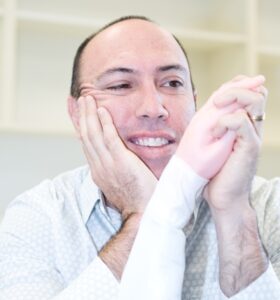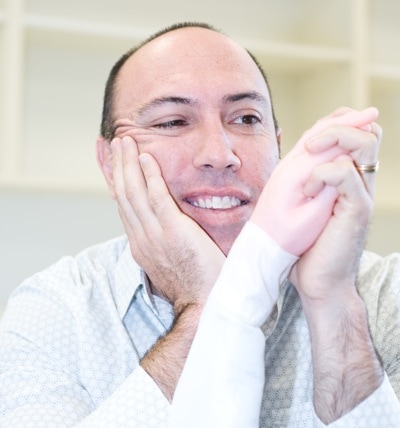In case you get bored in this post. I need to put my last sentence first: ‘So come to what looks like a fabulous evening in Sydney, run by the innovative MIND special interest group of the Australasian Faculty of Rehabilitation Medicine – ‘Happiness, depression and health care: Is the pursuit of happiness making us miserable’. It will be worth it. ’
I have two confessions to make. First, I was at an evening seminar a few weeks ago run by the South Australian branch of the Australian Physiotherapy Association. Dave Butler and I were ‘on the couch’ (actually we were on separate recliners – Dave’s was electric – mine was manual I seem to recall – I am not bitter about it…..) and Mark Jones was hosting us. I got asked a question about the role of positive psychology in chronic pain rehab. My answer was, in retrospect, naïve and hasty. I have to admit to a cortical error when I encounter ‘positive psychology’ – it somehow get’s transformed into ‘pop psychology’. I know they are different but why this miscategorisation? I think it is because I automatically think of the ‘happy’ industry. I know positive psychology is not about happiness.
I realize now that our evening on the couch was scheduled around about the time that Dr Martin Seligman was here in Adelaide – doing a few lectures and working with some of our schools as part of his gig as ‘South Australia Thinker in Residence’. My brother gets a woosh of South Aussie pride when he reflects on the Thinker in Residence programme and I can understand why – it feels like the mark of a sophisticated community. That we got turned away from a cafe in town at 4pm because it was closing does not have the same feel.
Now I really like Seligman’s messages – I prefer optimism to self-esteem, resilience to avoiding failure, and I really do think these things seem to be a lovely fit with some of what we are trying to do in chronic pain rehab and prevention. However, for some reason, my internal cognitive machinations do not equate Seligman with ‘positive psychology’, which is daft in the extreme. I transform positive psychology into ‘happy training’. I think of self-help books that supposedly teach you how to be happy. So, it was naïve and hasty of me to answer an excellent question from a position of some ignorance and through a flawed process of cognitive transformation. I should have said ‘dunno – what do you reckon?’ To the lovely person who asked the question, the crowd who were gathered, to Dave who probably would have offered a far more helpful and informed response, and to Seligman et al, I apologise.
My second confession: The happy market doesn’t grab me. The idea that one can read a book to become happy feels a bit like buying a latte or flat white (see our very interesting experiment on black noses and flat whites here) that is entirely crema. Crema is a significant contributor to a great coffee, but to have a cup full of crema would feel empty somehow I reckon. Happy feels like something that happens when a complex mix of things internal and external, chemical and circumstantial, planned and fortuitous, align. It feels like something that takes a whole of training and a fair bit of luck.
I concede that I find happy pretty easy – my folks reckon I was born happy – what a fantastic stroke of luck that is – so I may not understand what the chance of learning happiness might offer some people. But I can’t help but wonder if this swelling of fervour for happiness might be distracting us from a deeper longing – perhaps to love and be loved (I fear I may have just crossed the line here – is such a phrase allowed in a clinical science post?) Could the pursuit of happiness be making us miserable? Could the pursuit of happiness make recovery from pain even more difficult? Is it missing the point?
I don’t really know the answers to these questions and I am, pleasingly, not naïve nor hasty enough this time to offer them. However, there are people who are taking this on. Dr Jane Malone is an executive member of the MIND special interest group of the Australian Faculty of Rehabilitation Medicine. She and her colleagues have lined up two people very well placed to address these questions. If you are in Sydney you should go.
I would also be interested in what people who are not inflicted by a dodgy cognitive transformation think about the potential role of positive psychology in chronic pain rehab. Are there empirical studies on this? Are there research groups who are taking this on? Anyway, for now, let me say this: “Come to what looks like a fabulous evening in Sydney, run by the innovative MIND special interest group of the Australasian Faculty of Rehabilitation Medicine – ‘Happiness, depression and health care: Is the pursuit of happiness making us miserable’. It will be worth it. “
About Lorimer Moseley
 Lorimer is NHMRC Senior Research Fellow with twenty years clinical experience working with people in pain. After spending some time as a Nuffield Medical Research Fellow at Oxford University he returned to Australia in 2009 to take up an NHMRC Senior Research Fellowship at Neuroscience Research Australia (NeuRA). In 2011, he was appointed Professor of Clinical Neurosciences & the Inaugural Chair in Physiotherapy at the University of South Australia, Adelaide. He runs the Body in Mind research groups. He is the only Clinical Scientist to have knocked over a water tank tower in Outback Australia.
Lorimer is NHMRC Senior Research Fellow with twenty years clinical experience working with people in pain. After spending some time as a Nuffield Medical Research Fellow at Oxford University he returned to Australia in 2009 to take up an NHMRC Senior Research Fellowship at Neuroscience Research Australia (NeuRA). In 2011, he was appointed Professor of Clinical Neurosciences & the Inaugural Chair in Physiotherapy at the University of South Australia, Adelaide. He runs the Body in Mind research groups. He is the only Clinical Scientist to have knocked over a water tank tower in Outback Australia.
Link to Lorimer’s published research here. Downloadable PDFs here.



